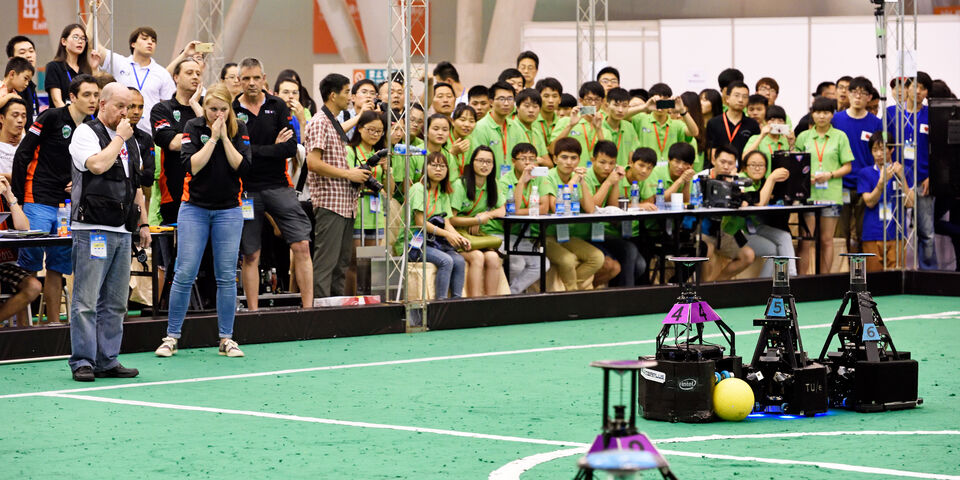The TU/e robot soccer team – Tech United – was given a rude awakening from the very start of the final as the Chinese opponent, Water, scored two goals within just 90 seconds, adding a third later on. It was only halfway through the first half that Tech United’s Robodinho managed to pull a goal back for Eindhoven. Following the break, Water quickly got a fourth goal and while Robodinho hit the post with a shot with just five minutes to go to set up a nail-biting finish, the Chinese defense held on bravely in the final minutes to keep the score, and the result, at 4-1.
Despite the defeat, the team is able to return with heads held high. “While we may have lost the final, it was the eighth RoboCup final in a row that we have contested,” says team captain Lotte de Koning. “Of course, it’s a sickening feeling to lose, and after the match we were all pretty down. But you have to hand it to the Chinese team – overall they were just too good. We know that and we saw how they gave absolutely everything in the final.”
Tech United participates in the so-called ‘Middle Size League’, or the ‘king class’ as it is called on account of the spectacular robot soccer. The matches are played by teams of five against five table-high soccer robots that play autonomously, without any kind of interventional human control. During the past few days in the Chinese city of Hefei the TU/e team has been defending its world title won last year in Brazil. A year earlier, in 2013, it had been the rival Water that took gold at the RoboCup in Eindhoven.
The care robots of Tech United, SERGIO and AMIGO, had to be satisfied with fourth place in the RoboCup @Home competition in China, a category in which the care robots taking part will in time be able to help older people live independently. Last year the team came second. Just before the final, the team was suddenly and unexpectedly confronted with start-up problems with SERGIO’s camera, which meant that precious time was lost in the final. “I’m afraid that a camera failure cost us the world title,” reflected the disappointed team captain Janno Lunenburg. “Of course, we feel gutted but we just have to pick ourselves up and try again next year.”
The aim of RoboCup is to accelerate the development of robot technology for the good of our society. RoboCup has therefore set out an objective: in 2050 a team of soccer robots must be capable of beating the human world champions. Since the participating researchers share their new knowledge with each other after each tournament, technology is advanced rapidly.


Discussion